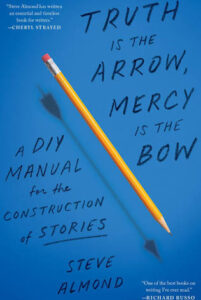
Reading and writing are two sides of the same enjoyment. We read novels to escape, and we write novels and stories to create other worlds…which is also escaping. And I know that many of my readers are also writers. So please read my review of a book that encourages writers, while also using WIT.
It is a book Steve Almond wrote (title is above) to help both writers and readers truly know and understand the POWER OF STORY. But you don’t always need to write story down, you also, right this moment, might consider yourself a STORY TELLER…and we all enjoy a person who can do that.
So whether you are a reader, a writer, a teacher or a student, Almond has some important points to make. Almond writes: “I believe that every single person on earth is a storyteller. We are all trying to understand the story of our lives. Some of us are also trying to make a career, or a calling, from the practice of writing. The essential tools of that pursuit are PATIENCE and FORGIVENESS and COURAGE.” (caps are mine)
Almond then writes: You have to want to tell the truth. (Unless you are writing fiction or comedy and then you can write whatever you want!)
A DIARY, A SHORT STORY, A NOVEL…the feeling we get when we read something great makes us often ask: How do we, as writers, no matter where we are on the spectrum of writing, perform that feat? Well, you need some amazing characters. After Almond reveals why F. Scott Fitzgerald’s characters in The Great Gatsby are so real to us, he writes: “The easiest way to conceptualize core identity is to consider someone you know intimately, a parent, a lover or a best friend. Now close your eyes and think about what makes them them.” And he suggests we look at physical attributes, gestures, nervous habits and colloquialisms.
If you are writing a diary, consider honesty and self-appraisal. The hard truth is usually more interesting than trying to pretty things up. And then Almond uses Joan Didion as a example. She had just arrived in New York from California. She is only 20 years old, freezing, with a high fever, and she writes: “It didn’t occur to me to call a doctor, because I knew none. And though it did occur to me to call the desk and ask for the air conditioner to be turned off, I never called, because I didn’t know how much to tip whoever might come…was anyone ever so young? I am here to tell you that anyone was me.”
I think this is a great example to get us to keep diaries. We all do foolish, brave and surprising things!
THE ENTRANCE
Almond tells us that major characters deserve an entrance. “Not just for the reader’s benefit, but so that YOU (the author) can establish their stake in the story, how their motives will interact with those of other characters. “
Almond then reminds us: this is how it works with strong characterization: the characters’ actions register as the inevitable outgrowth of their core identity. It is important to emphasize the word actions. because as Aristotle reminds us, it is action that determines the fate of your characters.
The above is just a sampling of what Steve Almond teaches about writing; his style is warm and easy to read. The cover to his book is also interesting. This is a must-read for writers and readers.

5 Responses
I love that Fitzgerald quote. When I write characters, I try to find someone who makes me FEEL something, whether love, amusement or anger. They can even be a character in a movie or on television, or of course, in real life. Someone who brings up those very feelings is pure gold.
Totally agree and thanks for posting. THat’s why for me reading novels is so important, because stimulates one’s own
ideas, so that I find myself with pies of notes when I am writing…which can also be annoying. Thanks again.
I don’t write anything but a blog. I’ve dabbled in fiction just a little. It’s been years since I last did that. It’s hard, especially when you don’t know what you’re doing, but it made me appreciate what a fiction writer does. My two preferred genres, dystopian and SF, both require great worldbuilding and sometimes (well, more than sometimes), character development gets left behind in the dust. But when a great writer (I’m thinking Kazuo Ishiguru and his novels Never Let Me Go and Klara and the Sun) writes in those genres, it becomes an transcendent experience for me. I like the title of this book you are recommending. Alana ramblinwitham
Alana I think it is wonderful that you enjoy dystopian and SF. Those are two genres that I would never know where to begin. You
really should sit down and write something, because that style is in your brain. Good luck, Beth
Hi Alana, I love knowing what others are reading. Wow, you read some heavy books. I say bravo.
And always thanks so much for your comments, Beth